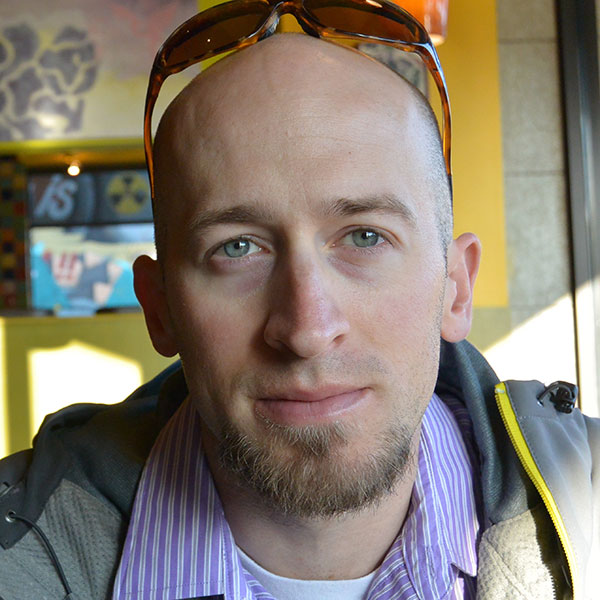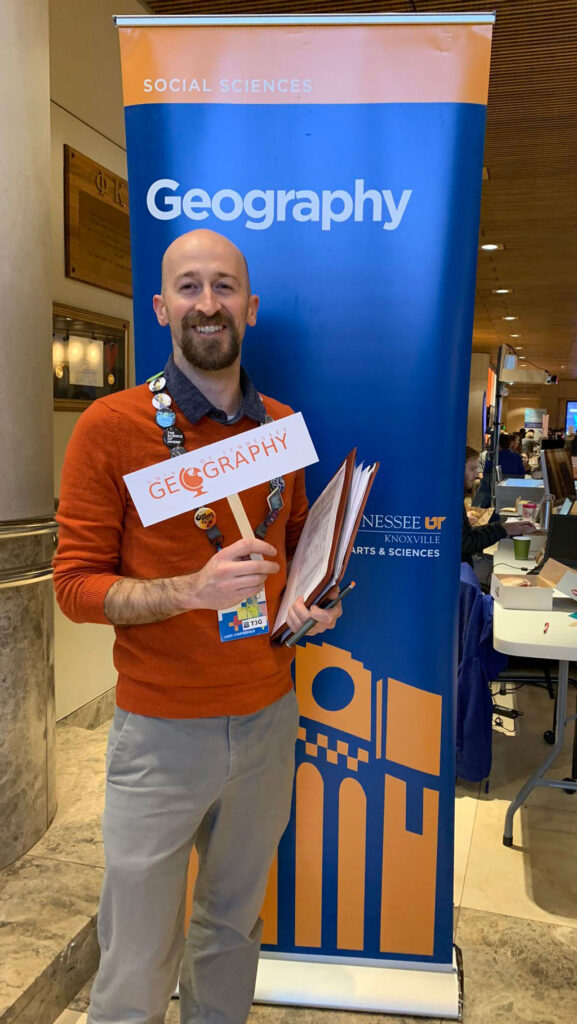Michael Camponovo
GIS Outreach Coordinator and Director of GIST Program at University of Tennessee, Knoxville

By Annie Liu, AAG Intern
Being the GIS Outreach Coordinator for the University of Tennessee, Knoxville’s Geography and Sustainability Department , as well as having various “other duties as assigned,” Michael Camponovo approached this new position by defining what he thought outreach should mean and who to outreach to. Groups like incoming students, current students, geography professionals, and the public are all prime targets for conducting outreach to ensure the department’s success in recruiting and retaining students. He then needed to decipher what to communicate and how to build relationships with the communities in question and decided to do so, oddly enough, the lens of a business.
Michael’s most recent degree is an M.B.A. from the University of Tennessee (UT), so he “had to think about the department like a business, which is normally something you don’t want to hear in higher ed… but [he] actually found it a really enlightening and fun exercise.” He discovered that thinking about returns on investments for his time, effort, and energy delivered the best results for outreach.
First, Michael thought about the supply and demand of students—where were the students coming from and how many did the Geography and Sustainability Department need. After some trial and error, he found that the best use of his time was working with and recruiting students who are already enrolled at UT.
Michael then had to ask himself, “What am I selling and what’s the quality of the product?” The answer was clear.“ … What we’re selling is an education, and most students one way or the other want some sort of career once they come out of the program.”
By “selling” a geographic education, he needed to focus on post-graduation outcomes for students, so he spent a lot of time working with professional partners. Michael is heavily involved with the Tennessee Geographic Information Council (TNGIC), the Tennessee statewide GIS professional organization, where he serves on the board, organizes conferences, and heads committees. By being involved, he stays knowledgeable about the skills that students need to be taught to be hired while simultaneously building an extensive network, so he is able to recommend students to employers.
On top of being a GIS Outreach Coordinator, Michael also teaches GIS and the geography major capstone course for seniors.
Using Networks to (Re)Discover Geography
“I never thought of myself as a geographer. I had a career before what I do now, where I was a public school teacher, and it turned out that after a couple years of doing that, I decided it wasn’t a good fit for me and I wanted to go back to school and do something different. I had such an unpleasant time being a public school teacher that I was really desperate to find something that brought me happiness and joy.”
Michael was reminded that he liked his GIS classes during undergrad and that it brought him the joy he was looking for, so he reached back out to his professor who happened to be another active member of TNGIC for advice. Since he already had a master’s degree in education for teaching, he only had to obtain a GIS certificate to start working in the field.
Unfortunately, this was right at the start of the 2008 financial crisis, which meant that no one was hiring. Fortunately, he had an opportunity to move to New Mexico with his wife for her pharmacy program, and the University of New Mexico had a paid research assistantship for GIS where Michael realized he was more of a geographer and not just solely a GIS person.
The Power of Mentorship
Michael emphasized the influence of amazing mentors he’s had throughout his time in higher education that he wouldn’t have been introduced to otherwise. He may have two master’s degrees, but what prepared him the most for his current position was his experience as a research assistant at UNM and the mentors he had there.
“I had an amazing mentor, Karl Benedict at UNM, and he was the head of the Earth Data Analysis Center (EDAC). I started out doing work for him like writing metadata and coding and that sort of stuff. They liked what I was doing and they had an opportunity to hire me full time. And so I went to work for them and I had two more amazing mentors, Shirley Baros and Mike Ingalls, and they took me under their wing and coached me up from being a student with potential to being a geospatial advocate for the State [of New Mexico].”
Michael’s new responsibilities required him to communicate to non-GIS people that GIS is helpful with natural hazard mitigation. He says he gave 20 presentations the first year of working at the EDAC, and now he gets paid to talk to people.
What geographic knowledge do you need for your current position?
Being the GIS Outreach Coordinator, Michael seems to know, and needs to know, a little bit of everything about geography. Why? So he can reach the maximum number of people with various interests in geography. He also needs to know what the high-level trends for technical skills are in geography to ensure post-graduation success for students. An example of Michael’s success is the geography department at UTK using ArcGIS Online earlier than most other programs, leading to students learning about StoryMaps and Dashboards earlier as well.
“The thing that has served me the best through my whole career is I’ve got a really good foundational knowledge of geospatial concepts, and I’m really good at Googling things. Because I have the right vocabulary, that makes it easier and more efficient for me to Google things … and quickly find the information that I need.”
What is your Favorite part of the job?
Michael’s face lit up at the question. For him, this was an easy question.
“Getting to watch my students succeed. It’s very satisfying to look at and get to experience all the different ways my students are successful. I’m at the point now where I’ve been doing what I’ve been doing about seven years, that I go to the state GIS Conference, [and] my former students are there representing companies like in the business Expo area. The students that I had are now at the point where they’re the people promoting their company or their services. I’ve got students who go on and work for the State Department, doing work at embassies! How cool is it that? I got to interact with these students and help them along their path! So yeah, for me that’s easily the best part.”
Any advice for those starting out their careers (or having a career crisis) if they want to have a position like yours?
 Michael is a big advocate of just going out there and talking to people! He recommends talking to people for those interested in any career ever. “The biggest thing is informational interviewing. Talk to people, find out what they do and find out if that’s a good fit for you.”
Michael is a big advocate of just going out there and talking to people! He recommends talking to people for those interested in any career ever. “The biggest thing is informational interviewing. Talk to people, find out what they do and find out if that’s a good fit for you.”
More specifically, to get a GIS Outreach Coordinator position at a large research university, Michael says, “You have to have a really awesome department head who thinks that this is a job that’s worthwhile to have.”
One also needs patience and empathy. “The last several years have taught us that you never know what’s going on behind the scenes. You never know what people are struggling with.”
For those interested in outreach, Michael says to stay curious and able to learn new things from different people. Also, as emphasized earlier, be someone who loves talking to people.
Closing out his interview, Michael quotes his favorite career consultant, Don Asher, author and public speaker, who says, “We all hear it’s not what you know, it’s who you know. [But] it’s not who you know, it’s who knows you.”
Michael continues, “Because I know Annie, [that ]means that I can be an advocate for Annie when she’s not in the room to someone else. So I’m vouching for that person. I’m putting my credibility on the line by saying that this person could be a good fit for you, and you really need that. And you don’t get that unless you talk to people and meet people and put yourself out there.”